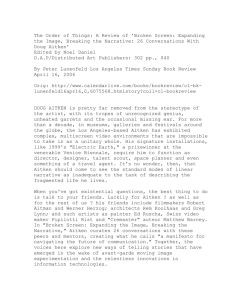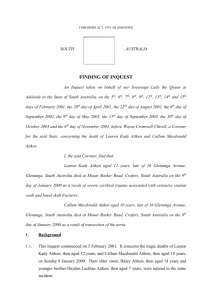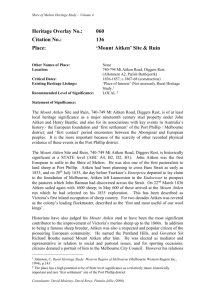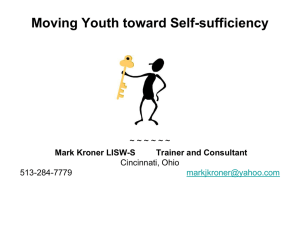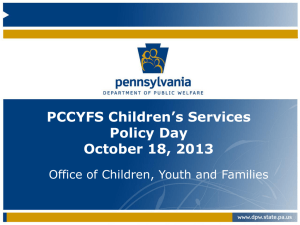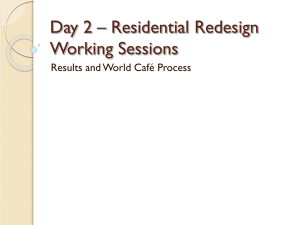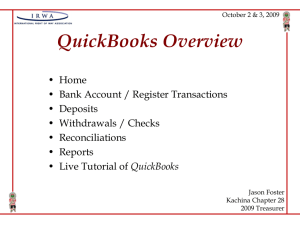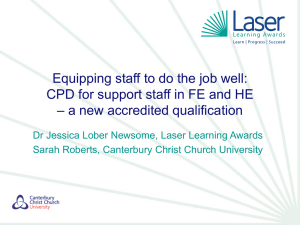Unit5MeasuringLeadershipCA670Online
advertisement
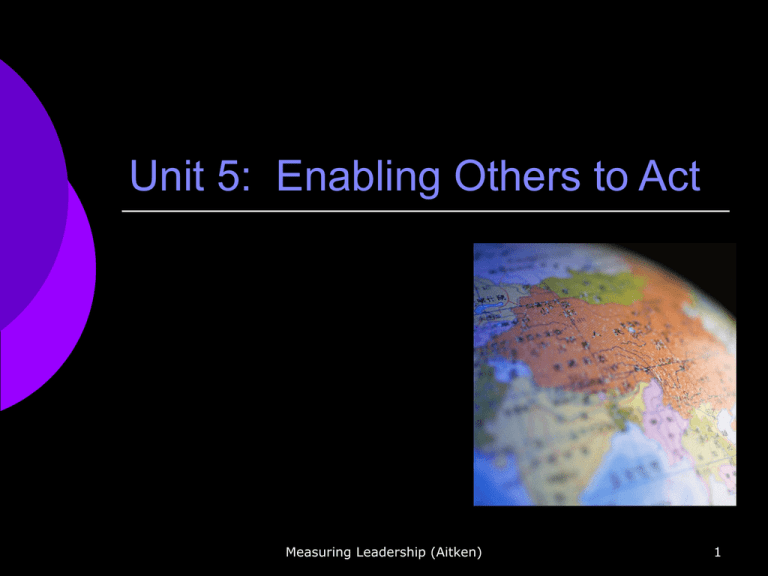
Unit 5: Enabling Others to Act Measuring Leadership (Aitken) 1 Exemplary leaders enable others to act. They foster collaboration and build trust. Leaders make it possible for others to do good work. Commitment: Foster collaboration by promoting cooperative goals and building trust. Strengthen others by sharing power and discretion. Collaboration improves performance. Measuring Leadership (Aitken) 2 Create a climate of trust: Trusting others pays off. Be open to influence. Make yourself vulnerable. Listen, listen, listen. Measuring Leadership (Aitken) 3 Facilitate positive interdependence Develop cooperative goals and roles. Support norms of reciprocity. Reward joint effort. Measuring Leadership (Aitken) 4 Support face-to-face interactions Sustain ongoing interaction Link to the human network. Socially and professionally, we need other people. Connect others to sources of power Share information and resources. Develop social awareness and social skills. Emotional intelligence is no passing fad. Measuring Leadership (Aitken) 5 Be the first to trust. Disclose information. Admit mistakes. Acknowledge the need for personal improvement. Ask for positive and negative feedback. Listen attentively to others. Invite all interested parties to important meetings. Share useful information. Acknowledge the contribution of others. Avoid talking negatively about others. Say "We can trust them," and mean it! Ask questions, listen, and take advice. Create jigsaw groups. Organize in a way that gives each person a piece of the puzzle. Every person is essential to the accomplishment of the final result. We think lower performers will do better. Focus on gains, not losses. Make a list of alternative currencies. Take a lot of human moments. The most genuine way to demonstrate that you care is to spend time with them. Create places and opportunities for information interactions. Measuring Leadership (Aitken) 6 Powerfully engaged people: I know what is expected. Do what I do best every day. Supervisor seems to care about me as a person. My opinions seem to count. Someone has talked to me about my progress in the last six months. In the last year I've had opportunities to work, learn, and grow. Measuring Leadership (Aitken) 7 Nearly 19% of all US workers feel powerless and are actively disengaged from their workplaces. They miss more than 3 times as many days of work as their more engaged peers. Measuring Leadership (Aitken) 8 Ensure self-leadership. Leaders accept and act on the paradox of power: We become most powerful when we give our own power away. Power is NOT a fixed sum. Give power to get power. Provide choice. Design in alternatives. Measuring Leadership (Aitken) 9 Develop competence and confidence. Strengthening others requires upfront investments in initiatives that develop people's competencies and foster their confidence. Share the data. Measuring Leadership (Aitken) 10 Practice problem solving. Confidence provides a way. Confidence is critical in the process of strengthening others. just because individuals know how to do something, that doesn't necessarily mean that they will do it. Self-confidence can affect people's performance. Having confidence and believing in your ability to handle the job, no matter how difficult, is essential in promoting and sustaining consistent efforts. By communicating to constituents that we believe that we and they can be successful, leaders help people to extend themselves and to persevere. Foster accountability. Measuring Leadership (Aitken) 11 Offer visible support. Exemplary leaders use their power in service of others because they know that capable and confident people perform better. Becoming powerful requires getting noticed. Measuring Leadership (Aitken) 12 Assign critical tasks. How can I give people more control over the resources they need to do their work? How can I make sure people are connected to the information they need? How can I make sure that I personally offer or acquire the support that people need to do the very best that they can? Measuring Leadership (Aitken) 13 Enrich people's jobs. Measuring Leadership (Aitken) 14 Enlarge people's sphere of influence. If you really want people to feel more powerful: Substantially increase signature authority at all levels. Remove or reduce unnecessary approval steps. Eliminate as many rules as possible. Decrease the amount of routine work. Assign non-routine jobs. Measuring Leadership (Aitken) 15 If you really want people to feel more powerful: Support the exercise of independent judgment. Encourage creative solutions to problems. Define jobs more broadly--as projects, not tasks. Provide more freedom of access, vertically and horizontally, inside and outside. Measuring Leadership (Aitken) 16 Educate, educate, educate. Create a learning climate. Measuring Leadership (Aitken) 17 The people who make a difference in our lives are the ones who care. Measuring Leadership (Aitken) 18 Remember to discuss and post, including your Knowledge Question Measuring Leadership (Aitken) 19 Post: Any thoughts about Enron this week? Measuring Leadership (Aitken) 20 Leadership Inventory Progress Workshop for your Core Assessment Select 3-5 key values that propel you personally. Select 3-5 key values of your organization. http://www.stevepavlina.com/articl es/list-of-values.htm Measuring Leadership (Aitken) 21 Evolving Definition of Leadership This Week’s Model: Sec. R. McNamara What are characteristics of his leadership? Find the video or a segment to view. http://video.google.com/video play?docid=884441990184719 2004&q=Fog+of+War&total=4 24&start=0&num=10&so=0&ty pe=search&plindex=2 Measuring Leadership (Aitken) 22
